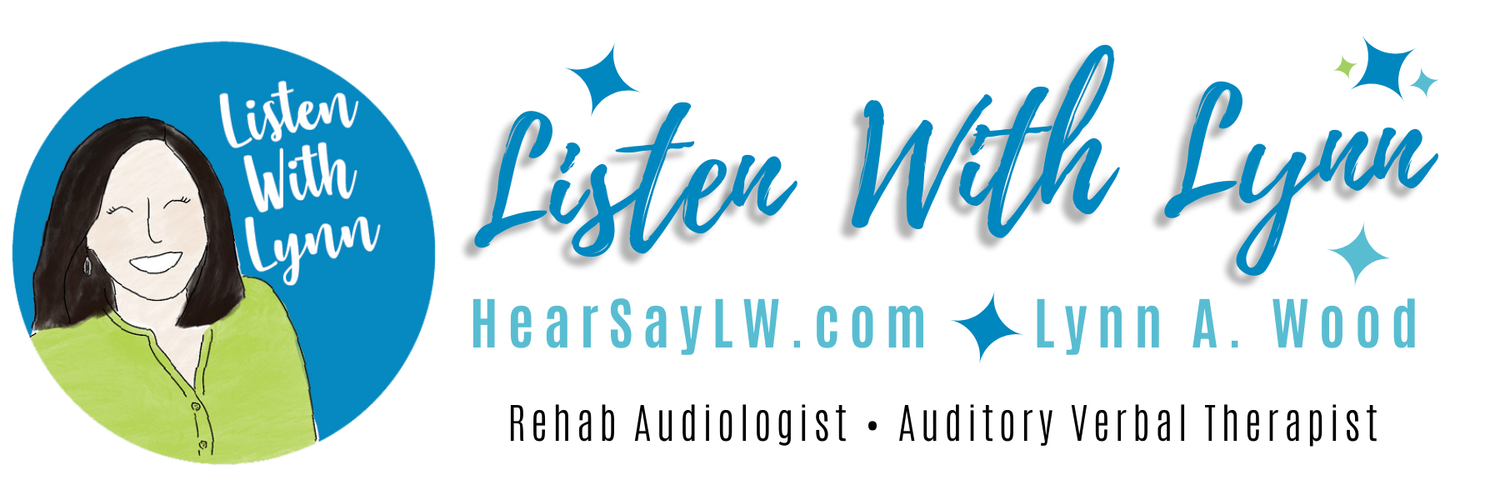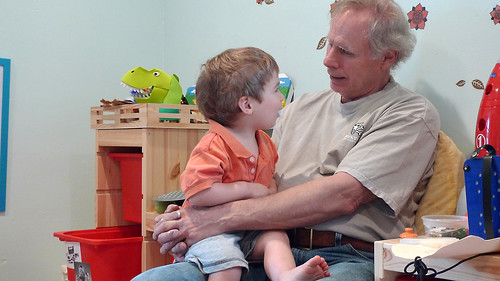Here is an article written by my colleague, Todd Houston who is a professor at my alma mater, The University of Akron that you won't want to just skim over. Todd's writing was voted one of the Most Popular 2012 ASHAsphere Posts published by the American Speech, Language and Hearing Association.
Dr. K. Todd Houston, Ph.D., CCC-SLP Cert AVT, wrote about the trend of parents choosing spoken language options, such as Auditory-Verbal Therapy, for their children with hearing loss“.
HERE is a link to view all the most popular posts from ASHAsphere for 2012.
HERE is the link for Todd Houston's article that I have reposted below.
Definition of Auditory-Verbal Therapy
Dr. K. Todd Houston, Ph.D., CCC-SLP Cert AVT, wrote about the trend of parents choosing spoken language options, such as Auditory-Verbal Therapy, for their children with hearing loss“.
HERE is a link to view all the most popular posts from ASHAsphere for 2012.
HERE is the link for Todd Houston's article that I have reposted below.
MARCH 29, 2012BY 16 COMMENTS
Auditory-Verbal Therapy: Supporting Listening and Spoken Language in Young Children with Hearing Loss & Their Families
Approximately 95% of parents of children with hearing loss are hearing themselves (Mitchell & Karchmer, 2004), and trends indicate that many parents are choosing spoken language as the primary mode of communication for their children with hearing loss. In fact, some states such as North Carolina, are reporting that parents are choosing spoken language options for their children with hearing loss more than 85% of the time (Alberg, Wilson & Roush, 2006), especially when they know spoken language is a viable outcome for their child. And, these parents are typically selecting approaches that support listening and spoken language, such as Auditory-Verbal Therapy, without initiating visual communication systems.
With early identification and the use of advanced hearing technology, children with even the most severe or profound hearing losses can access audition and follow an intervention approach focused on achieving typical developmental milestones in listening, speech, language, cognition, and conversational competence. Parents’ communication choices are based on their long-term desired outcomes for their child. Once those decisions are made, professionals providing early intervention and habilitative services should support the parents’ choices and provide the necessary support and intervention to ensure, to the greatest extent possible, that the child achieves those outcomes.
The Alexander Graham Bell (AG Bell) Academy for Listening and Spoken Language, which is based in Washington, DC, governs the certification of Listening and Spoken Language Specialists (LSLS), the practitioners qualified to provide Auditory-Verbal Therapy. The Academy defines the practice of Auditory-Verbal Therapy as:
“Auditory-Verbal Therapy facilitates optimal acquisition of spoken language through listening by newborns, infants, toddlers, and young children who are deaf or hard of hearing. Auditory-Verbal Therapy promotes early diagnosis, one-on-one therapy, and state-of-the-art audiologic management and technology. Parents and caregivers actively participate in therapy. Through guidance, coaching, and demonstration, parents become the primary facilitators of their child’s spoken language development. Ultimately, parents and caregivers gain confidence that their child can have access to a full range of academic, social, and occupational choices. Auditory-Verbal Therapy must be conducted in adherence to the Principles LSLS of Auditory-Verbal Therapy” (AG Bell Academy, 2012).
The Principles of Auditory-Verbal Therapy: Defining Practice
The Academy has endorsed a set of principles that delineate the practice of Auditory-Verbal Therapy:
- Promote early diagnosis of hearing loss in newborns, infants, toddlers, and young children, followed by immediate audiologic management and Auditory-Verbal Therapy;
- Recommend immediate assessment and use of appropriate, state-of-the-art hearing technology to obtain maximum benefits of auditory stimulation;
- Guide and coach parents to help their child use hearing as the primary sensory modality in developing spoken language;
- Guide and coach parents to become the primary facilitators of their child’s listening and spoken language development through active consistent participation in individualized Auditory-Verbal Therapy;
- Guide and coach parents to create environments that support listening for the acquisition of spoken language throughout the child’s daily activities;
- Guide and coach parents to help their child integrate listening and spoken language into all aspects of the child’s life;
- Guide and coach parents to use natural developmental patterns of audition, speech, language, cognition, and communication;
- Guide and coach parents to help their child self-monitor spoken language through listening;
- Administer ongoing formal and informal diagnostic assessments to develop individualized Auditory-Verbal treatment plans, to monitor progress, and to evaluate the effectiveness of the plans for the child and family; and
- Promote education in regular school with peers who have typical hearing and with appropriate services from early childhood onwards.
The Listening and Spoken Language Specialist (LSLS):
Two Paths to Certification
The AG Bell Academy has designated two paths to certification for Auditory-Verbal practitioners: LSLS Certified Auditory-Verbal Therapist (LSLS Cert. AVT) and the LSLS Certified Auditory-Verbal Educator (LSLS Cert. AVEd). The LSLS certification is awarded to qualified professionals who have met rigorous academic, professional, post-graduate education and mentoring requirements, and have passed a certification exam. Typically, LSLS certified practitioners are licensed audiologists, speech-language pathologists, or educators of the deaf who have the required background, training and experience in listening and spoken language theory and practice with children with hearing loss and their families. For additional information about certification as a Listening and Spoken Language Specialist (LSLS), speech-language pathologists and audiologists should contact the AG Bell Academy at academy@agbell.org, visit the website ate www.agbellacademy.org, or call (202) 204-4700.
References
Alberg, J., Wilson, K., & Roush, J. (2006). Statewide collaboration in the delivery of EHDI services. The Volta Review, 106, 3, 259-274.
AG Bell Academy for Listening and Spoken Language (2012). 2012 certification handbook. Available at www.agbellacademy.org
Mitchell, R.E. & Karchmer, M.A. (2004). Chasing the mythical ten percent: Parental hearing status of deaf and hard of hearing students in the United States. Sign Language Studies, 4, 2, 138-163.
Dr. K. Todd Houston, Ph.D., CCC-SLP, LSLS Cert. AVT, is an Associate Professor in the School of Speech-Language Pathology and Audiology at The University of Akron. His primary areas of research include spoken language acquisition in children with hearing loss, strategies for enhancing parent engagement in the intervention process, Auditory-Verbal Therapy, and telepractice. He directs the Telepractice and eLearning Laboratory (TeLL), an initiative to evaluate clinical practices in the area of distance service delivery in Speech-Language Pathology.

